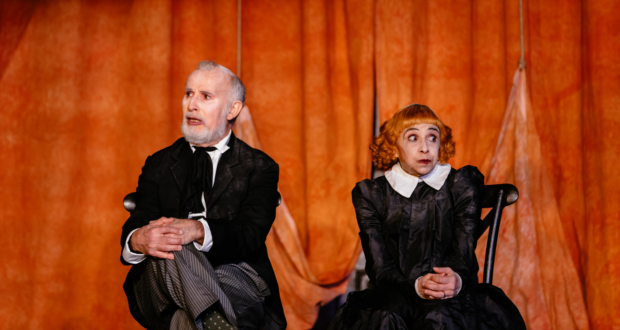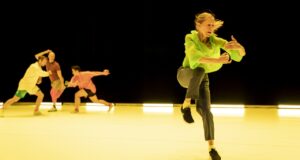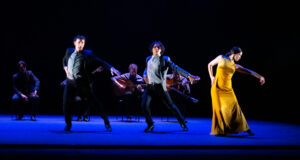Imbued with meaning and connection, The Chairs pokes at the rich hilarity of life with a big nihilist stick. A slick, skilful absurdist production that adds to the Almeida’s strong tradition of reimagining classical texts.Summary
Rating
Unmissable!
It’s been almost 70 years since The Chairs was first produced in Paris. As I brave a bracing February walk through Islington, I wonder – why now? Is Ionesco’s one-act absurdist play, where the majority of the characters are invisible, really the best way to capitalise on theatre-deprived audiences?
The answer is unequivocally: yes. From the moment the Old Man (Marcello Magni) and Old Woman (Kathryn Hunter) claim the stage, through to the bitter end, it is absolutely riveting. And that’s pretty good going for an ambitious 1hr 50 min straight-through interpretation. Magni and Hunter are an absolutely perfect comic double-act. Hunter embodying her character almost like a clown or marionette, arms often lifted unnaturally high as if suspended by strings and sharing wide-eyed glances with the audience. Magni flows around the stage, a bundle of nervous energy that hits a huge number of physical gags – the influence of Complicité (Magni is a founding member) clear.
The play inhabits a strange duality of suspension of disbelief, the fourth wall regularly breached. Before the play’s even begun we are seemingly privy to a conversation between the actors in the dressing room. The audience chuckles nervously, has the play started? Then we are treated to great panto-esque comedy, actors engaging with props wielded by a clearly visible stagehand. Much is made of these clearly false actions, and the audience lap up the implausible world they inhabit. Then the first of the invisible guests arrive and suddenly there’s a real change in tone. Where before the falsehood of the world was played purely for laughs, now there is an utter commitment to bringing to life a character we can’t even see, who may not even exist. I find myself reflecting on whether these guests are merely a fabrication of the character’s minds, or some fumbled memory. Rendered so obviously not present and yet present on stage by their impact on the behaviours of those around them, this depiction picks at the scab of an idea: are our thoughts and memories any less real than physical actions?
But there’s no time to reflect for long, and no time for either of the central characters as the play careers along. A long crescendo is building, more and more guests arrive to learn of the Old Man’s philosophy, all waiting eagerly for the arrival of the Godot-like Speaker (Toby Sedgwick). Along the way the play uncovers the Old Man’s desire for legacy, his yearning for identity. The Old Woman laments that he didn’t accomplish more in life, if only he’d been more ambitious. All the while there is an urgent and growing need for chairs – more chairs! – to seat the swelling numbers of intangible arrivals. As the stage grows increasingly cluttered with noise and chairs, we feel the full weight and chaos of life upon the backs of the characters. The set design is cleverly conceived and serves the play wonderfully.
Sometimes there’s a danger with absurdist theatre, that the awkward repetition of sound and movement can disengage an audience who become painfully aware that this all should mean something very profound. There is none of that here. For me, at least, the play is imbued with meaning and connection throughout and never stops poking at the rich hilarity of life with a big nihilist stick. It helps that the production is fearless in tiptoeing across myriad genres and devices, keeping it fresh.
You could call The Chairs “an anecdote with a punchline”. If that’s the case, the Almeida’s production comes with a substantial footnote. It kind of blindsides me. It fits snugly into the themes Ionesco laid down 70 years ago and blends smoothly into the present day. I’m hooked on the piece’s every word until the death – a snapshot of the play in microcosm, the image of which still sits with me. This production is slick, skilful absurdism and adds to the Almeida’s strong tradition of reimagining classical texts. Honestly? One of the best things I’ve seen in a long time.
Written by: Eugène Ionesco
Translated and directed by: Omar Elerian
Designer by: Cécile Trémolières and Naomi Kuyck-Cohen
Lighting Designer Jackie Shemesh
Sound Designer Elena Peña and Pete Malkin
The Chairs plays at The Almeida until 5 March. Further information and booking via the below link.
 Everything Theatre Reviews, interviews and news for theatre lovers, London and beyond
Everything Theatre Reviews, interviews and news for theatre lovers, London and beyond




2 comments
Pingback: The Etties: Best Drama Nominations - Everything Theatre
Pingback: The Etties: Greatest Drama Nominations - CityENews.com